Garrett cites Cornell and 'Ithaka' spirit as lifetime journeys
By Joe Wilensky
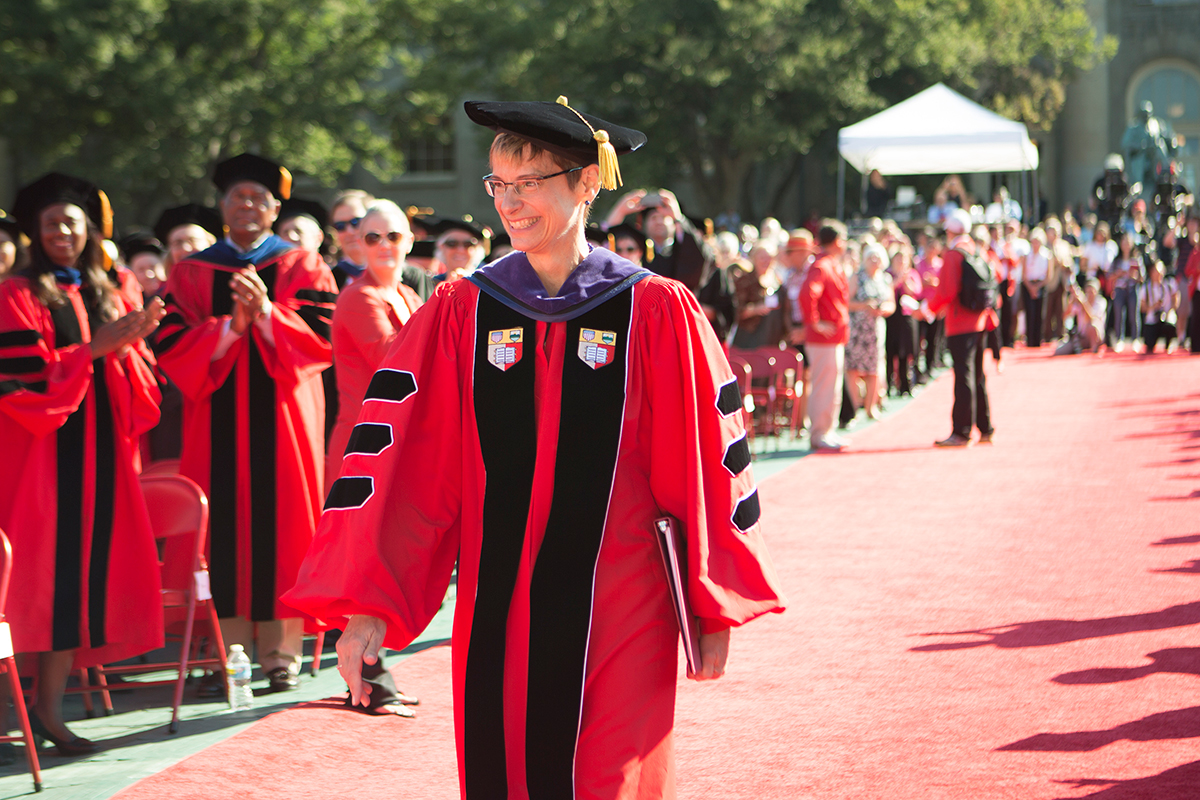
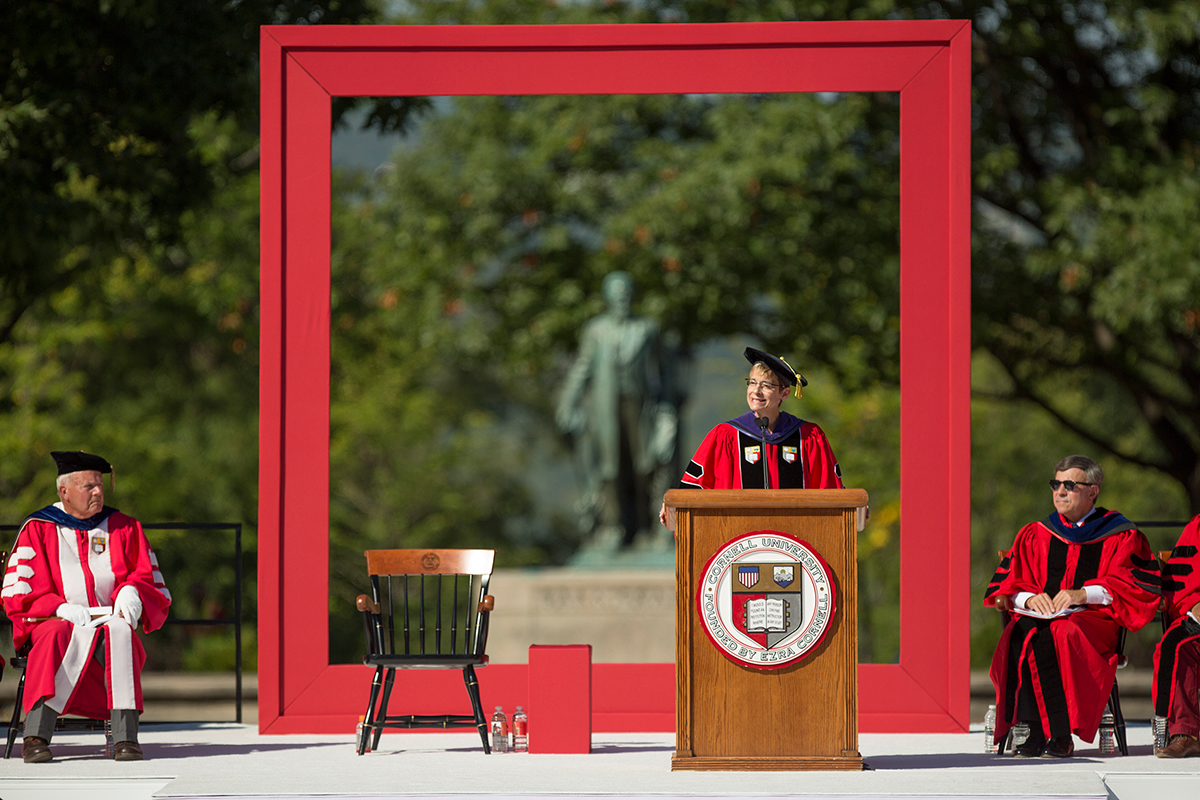
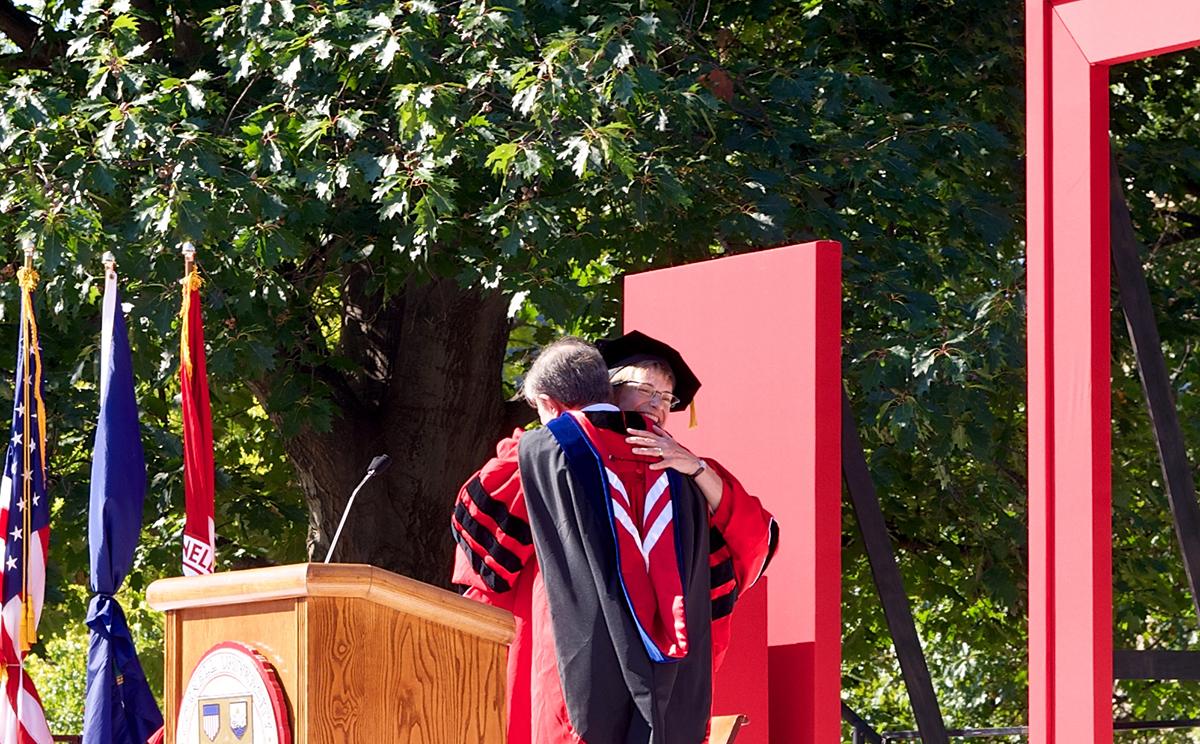
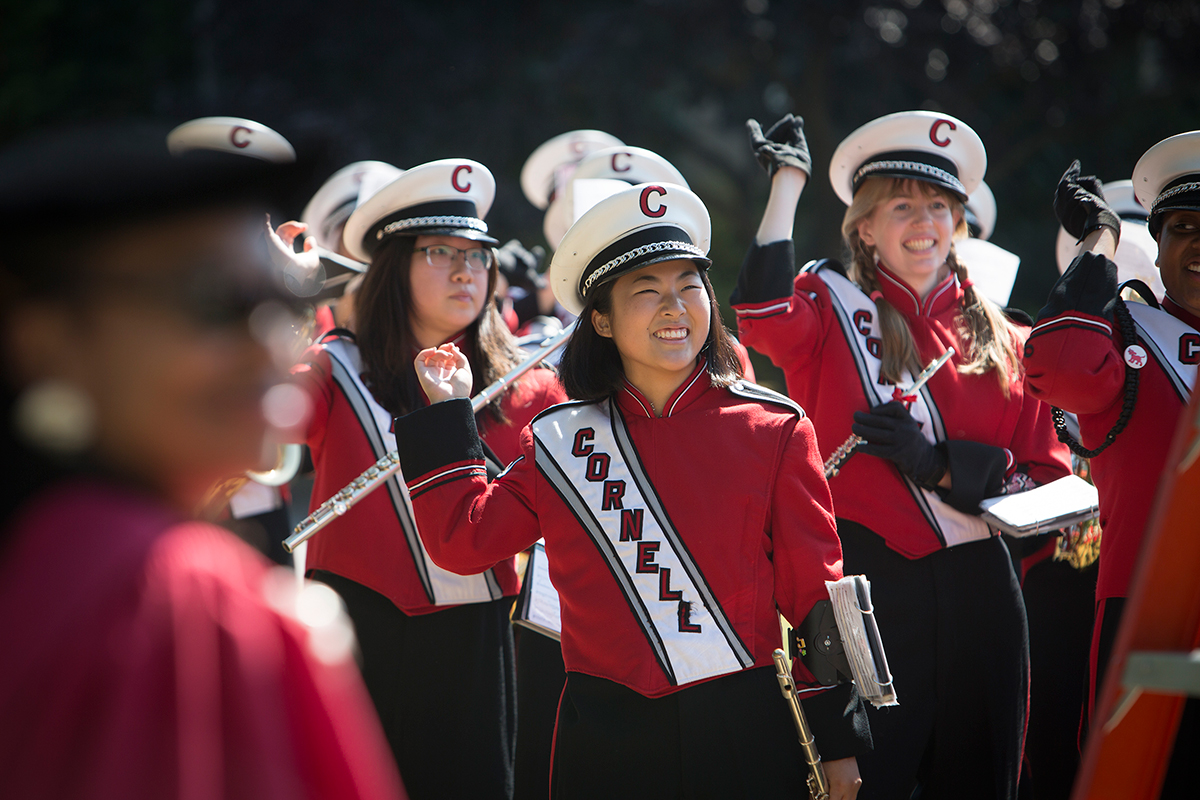
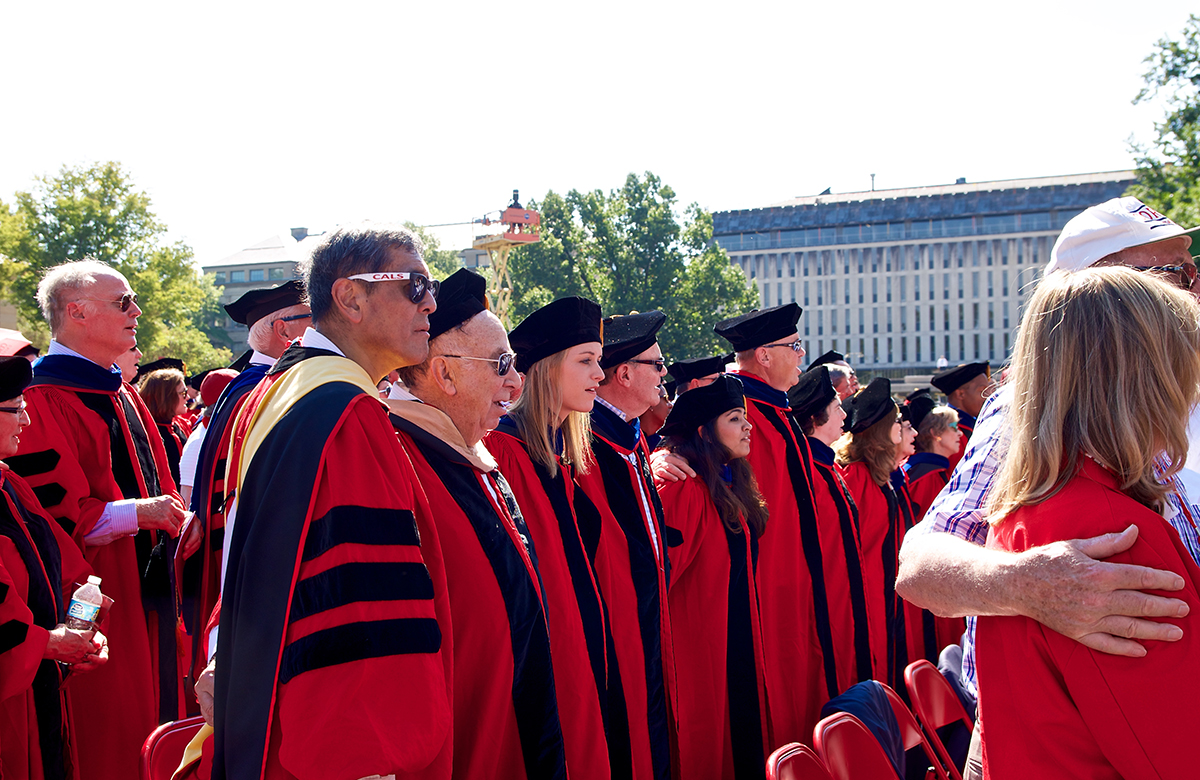
Cornell University is a state of mind, a beginning and a destination, much like the “Ithaka” of C.P. Cavafy’s poem about Ulysses’ journey home, said President Elizabeth Garrett Sept. 18 following her installation as the university’s 13th president.
With nary a cloud in the sky and warm, late-summer temperatures, Garrett’s inauguration ceremonies were held on the Arts Quad under the watchful gaze of the statues of the university’s founder, Ezra Cornell, and first president, Andrew Dickson White. Thousands watched, on the Arts Quad and online.
The acrobatic percussion of Yamatai, Cornell’s Taiko drumming group, began the ceremony, followed by selections from the Cornell University Chorus and Wind Symphony as the academic procession traveled from Olin Library to the quad.
Calling Garrett “the 13th in a series of extraordinary leaders who have, over 150 years, helped build Cornell,” Robert Harrison ’76, chair of the Cornell Board of Trustees, spoke about Cornell’s 150 years of history and its past presidents before introducing Garrett and conducting the investiture.
Harrison quoted the late university historian Morris Bishop, Class of 1913, who, at Cornell’s centennial celebration in 1965, said: “It is your duty to look forward and not back, and without forgetting old wisdom, to seek a wisdom ever new, to prepare an even greater Cornell.”
“Bishop’s exhortation is especially meaningful today,” Harrison said. “His advice is at once practical and lofty, exactly like Cornell.”
The Cornell University Garrett inherits, Harrison said, “has been shaped by its traditions and achievements, but also by an adamant refusal to sit still and accept the status quo.” It is this dynamic, he said, that has built the Cornell we cherish.
Faculty and students as voyage partners
In her address, Garrett spoke of “the spirit of Cornell that frames our journey” and stressed the importance of the faculty as the foundation of the university; students as partners in the voyage of discovery and making a difference in the world; and the growing Cornell Tech campus in New York City that amounts to a new land grant.
Garrett quoted former Cornell historian Carl Becker, who explained the university’s character was formed by a different freedom than that which characterized other universities: “Something less formal, something less self-regarding, something more worldly, something, I venture to say, a bit more impudent.” With that freedom comes responsibility, Becker notably said, which means Cornell’s work must be continuously re-evaluated and re-created to meet current challenges, Garrett said.
Returning to the Cavafy poem several times during her speech, Garrett described how we can “remain true to our ‘Ithaka’ … as we embark on our next 150 years.”
“The faculty of any great university define its spirit,” Garrett said, and quoted A.D. White’s famous line: “Better a splendid and complete faculty in a barn than an insufficient faculty in a palace.”
“The recruitment, development and retention of the best faculty remain our paramount priorities,” Garrett said, noting that the faculty is the bedrock of teaching, research, creative work and Cornell’s public mission; it is they who apply that knowledge to the world’s most pressing problems; and it is the faculty “who attract the finest students and inspire them to embark on their own adventures of learning.”
While seeking to continue hiring the best faculty in a competitive global environment, the university must focus its energies and resources strategically, Garrett said, noting, “we remain dedicated to the diversity of disciplines and subjects that we find on all our campuses, but realistically, no institution can be excellent in ‘any study.’” She said Cornell must critically assess which studies to emphasize in its quest for excellence, organizing “ourselves in ways that ensure our work has the greatest impact, that propel us forward to innovations and new applications.” The university must be guided by the spirit of “any study” by defining scholarly targets with breadth, and taking into consideration “our impact on policy and the quality of life throughout the world.”
While higher education and its cost in the United States has been the subject of much public criticism and debate, Garrett said, “It is beyond dispute that an intense residential undergraduate experience at America’s great research universities is one of the very best investments any family can make.
“Because of the experience at Cornell, our graduates will have more fulfilling opportunities on their journeys; they will have brighter economic futures; but, most importantly, they will experience life’s adventures more deeply and with greater satisfaction,” Garrett said. “Their education is worthy of their own investment, our country’s investment, and the investment of Cornellians who have come before them – because our graduates will define the future.”
In the coming months, Garrett said, the university will focus more intensely on the residential undergraduate experience, defining as a community the shared intellectual experience all Cornell students should encounter and “ensuring they can more easily navigate the complexities of our diverse university to construct meaningful plans of study.”
Citing the Cavafy poem, Garrett spoke of those on the Cornell journey of discovery who can stop at the university’s “trading stations” around the globe: “in Tanzania and Rome; in Geneva, New York, and Doha, Qatar; in Washington, D.C., and Maine; in every county of New York through our cooperative extension presence.”
Most significant is Cornell’s presence in New York City, she said – no other leading American university can claim this duality: a home in a quintessential college town and also a substantial footprint in an international urban center.
Cornell Tech in particular, which already is redefining graduate education, represents a “new land grant” (as described by former New York City Mayor Michael Bloomberg) that is helping the city become a leader in technological innovation. But this opportunity will be a defining moment for Cornell only if the lessons learned at Cornell Tech are brought back to faculty, students and staff here in Ithaca, she said. All colleges must find deeper ways to connect with Cornell Tech, she said, involving all disciplines in collaborations, degree programs and new delivery platforms.
These connections and entrepreneurial aspirations must benefit not just faculty and students in New York City, she said, but must bring new possibilities for faculty and students in Ithaca, as well as economic opportunities for Ithaca and upstate New York.
Cornell is charting its course for the next 150 years, she said. “… we will lead the world in creating new paths to discovery, knowledge and the many ways we can move closer to truth, in launching our students on their own voyages.
“I look forward to working with all Cornellians – faculty, students, staff, alumni, parents and supporters – to navigate the next stage of this remarkable journey, traveling to the many diverse ‘Ithakas’ that await our discovery.”
Alice Fulton, the Ann S. Bowers Professor of English, read several poems (three, including one written specifically for the inauguration, are reprinted in the official inauguration book). BJ Siasoco, chair of the Employee Assembly; Juliana Batista, president of the Student Assembly; and Richard Walroth, president of the Graduate and Professional Student Assembly, gave readings as well.
Selections from the Cornell University Chorus, Glee Club and Cornell Wind Symphony, concluding with the alma mater, closed the ceremony as the academic recessional began, played out by the Big Red Marching Band.
Media Contact
Get Cornell news delivered right to your inbox.
Subscribe